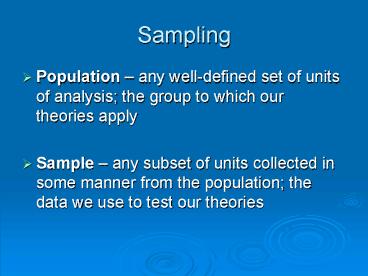Sampling PowerPoint PPT Presentation
1 / 29
Title: Sampling
1
Sampling
- Population any well-defined set of units of
analysis the group to which our theories apply - Sample any subset of units collected in some
manner from the population the data we use to
test our theories
2
Types of Samples
- Probability sample each element of the
population has a known probability of being
included in the sample - Nonprobability sample - each element of the
population has an unknown probability of being
included in the sample
3
Types of Nonprobability Samples
- Convenience sample elements are included
because they are convenient or easy for the
researcher to select - Problem may not be representative of the
population to which we want to generalize
4
(No Transcript)
5
Famous Example of Convenience Sampling
- Literary Digest used automobile registration
lists and telephone directories as sampling frame
for presidential polls - 1928 - 18 million postcards to accurately predict
outcome of 1928 election (Hoover-R) - 1932 20 million postcards to accurately predict
1932 election (Roosevelt-D)
6
Famous Example of Convenience Sampling
- Literary Digest used automobile registration
lists and telephone directories as sampling frame
for presidential polls - 1928 - predicted Hoover-R
- 1932 predicted Roosevelt-D
- 1936 predicted Landon (R) 54
- What happened?
7
Famous Example of Convenience Sampling
- Before 1936
- Upper class/Working Class more or less
representative partisan distribution
8
Famous Example of Convenience Sampling
- Before 1936
- Upper class/Working Class more or less
representative partisan distribution - 1936 and beyond
- Upper class disproportionately Republican
- Working class disproportionately Democrat
9
Types of Nonprobability Samples
- Quota samples elements are chosen based on
selected characteristics and the representation
of these characteristics in the population - Insures accurate representation of selected
characteristics - Elements with selected characteristics chosen in
convenience fashion
10
Famous Examples of Quota Samples
- 1936 George Gallup used quota sampling to
accurately predict - The (inaccurate) Literary Digest prediction
- The winner of the 1936 election
- 1948 quota sampling incorrectly predicts Dewey
to defeat Truman
11
Types of Probability Samples
- Simple random sample each element of the
population has an equal chance of being selected - Systematic sample elements selected from a list
at predetermined intervals
12
Types of Probability Samples
- Stratified sample elements in population are
grouped into strata, and each strata is randomly
sampled
13
Types of Probability Samples
- Cluster sample elements are grouped into
clusters, and sampling proceeds in two stages - A random sample of clusters is chosen
- Elements within selected clusters are then
randomly selected and aggregated to form final
sample - This is the sampling method used in many national
surveys (e.g. clustersmetropolitan areas, zip
codes, area codes)
14
Sampling and Statistical Inference
- Frequency distributions
- Mean and Standard deviation
- Proportions
- Sampling distribution
- Standard error
- Sampling error
- Confidence interval
15
Frequency Distributions
- For any variable X, a tabular or graphical
display of the number of observations per
value/category of that variable
16
Mean and Standard Deviation
- For any collection of observations measured at
the interval or ratio level - Mean the simple average
- Standard deviation the average distance of
each observation from the mean (intuitive
definition)
17
Mean and Standard Deviation
- Weekly Income Mean Deviation
- 100 100 200 -100
- 150 150 200 -50
- 200 200 200 0
- 300 300 200 100
- 250 250 200 50
- Mean 200 Standard Deviation 79.06
18
Proportion
- The ratio of the number of observations taking a
specific value, to the total number of
observations - P / N
- Example 4/10.40
19
Sampling Distribution (of sample proportions)
- Population
- Draw Random Sample of Size N
- Calculate sample proportion
- Repeat until all possible random samples of size
N are exhausted - The resulting collecting of sample proportions is
the sampling distribution of sample proportions
20
Sampling Distribution of Sample Proportions
- Def A frequency distribution of all possible
sample proportions for a given sample size (N) - The mean of the sampling distribution will be
equal to the population proportion.
21
Standard Error
- How the sample proportions vary from sample to
sample (i.e. within the sampling distribution) is
expressed statistically by the value of the
standard deviation of the sampling distribution. - (Standard deviation the average distance of
each observation from the mean)
22
Standard Error, cont.
- The standard error for a sample proportion is
equal to the square root of P(1-P) / N
23
The Standard Error and the Margin of Error in
Surveys
- The standard error is a measure of sampling
variability for a sample statistic - If we know the standard error, we can calculate a
margin of error for our sample proportion
24
Calculating the Margin of Error
- First, we must choose a level of certainty
(confidence level) usually 95 - The margin of error (with a 95 confidence level)
is equal to 1.96SE
25
Example Presidential Approval
- Newsweek Poll conducted by Princeton Survey
Research Associates International. Sept. 29-30,
2005. N1,004 adults nationwide. MoE 3.. - "Do you approve or disapprove of the way George
W. Bush is handling his job as president? (40
approve)
26
Calculating the margin of error for a 40
approval rating
- The standard error for a sample proportion is
equal to the square root of P(1-P) / N - The margin of error (with a 95 confidence level)
is equal to 1.96SE - .40.60/1004.000239
- v.000239 .01546
- 1.96.01546.03
27
Example of a Sampling Distribution
28
Example of a Sampling Distribution
29
Sample Size and Sampling Error

